May 19, 2025 | 20:21 GMT +7
May 19, 2025 | 20:21 GMT +7
Hotline: 0913.378.918
May 19, 2025 | 20:21 GMT +7
Hotline: 0913.378.918
Nhat Thong Co. Ltd's agricultural farm, located a mere 10 km from the bustling Southern metropolis, finds itself surrounded by towering skyscrapers and ongoing real estate projects. Despite the encroaching urbanization, the farm remains unwavering in its commitment to its initial goal. The discovery of a sense of escape through a breath of fresh air under the shade of trees, flower beds, vegetable gardens, ponds, and wooden houses left us astonished. The atmosphere resembles that of a park rather than a farm.
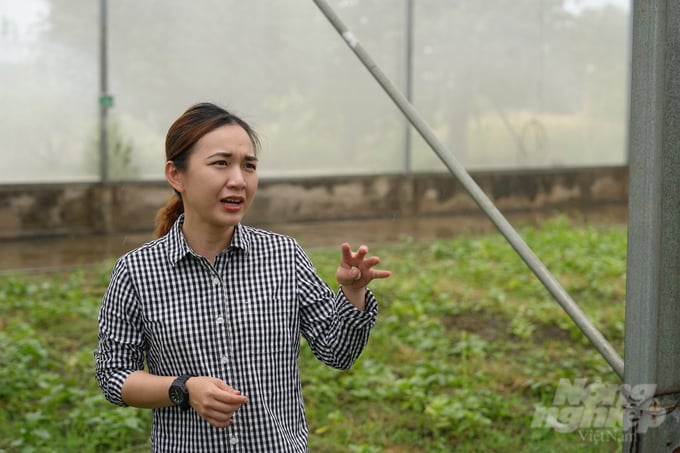
Duong Thi Anh Thu, the production manager of the company, said that Nhat Thong farm has achieved 3 prestigious certificates from the US, Japan, and Europe on clean agriculture. Photo: Hong Thuy.
During our visit to the farm, Duong Thi Anh Thu, the production manager of the company, provided us with a guided tour. She informed us that the farm spans across 12 hectares, with 2 hectares dedicated to greenhouse vegetables produced according to organic processes. The farm has received three organic certifications from USDA-NOP, EU Organic, and JAS Organic, and the highest level of product quality in food agriculture has been achieved.
According to Thu, the process of caring for vegetables adheres to a specific set of criteria consisting of 250 figures. Vegetables undergo a rigorous process of preliminary processing after being harvested. This includes being treated with clean water and undergoing measures to eliminate harmful microorganisms found in the intestines.
Prior to being packed for the market, vegetables undergo a drying process through centrifugation. The vegetables are ready to be cooked without needing further washing.
Nhat Thong farm has spent almost four years clearing soil for farming since 2013 in order to obtain organic certifications. After a year of cultivating vegetables, the farm successfully obtained the US organic certificate by the end of 2016.
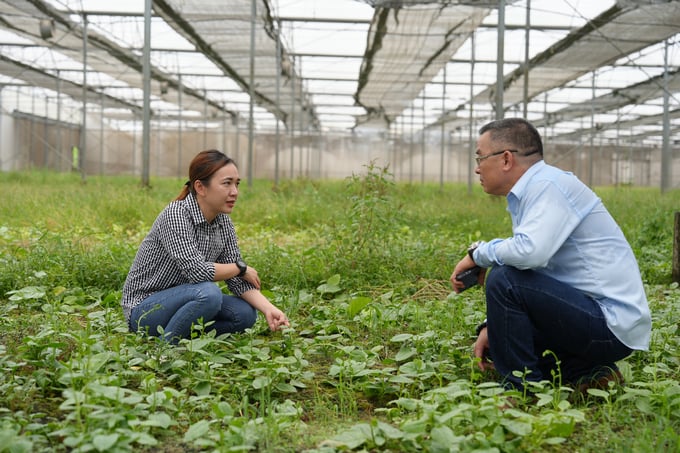
The whole process of care, harvesting and preliminary processing follows the organic process. Photo: Tuy Hoa.
According to Pham Huu Thoi, the General Director of Nhat Thong Company, he has been committed to organic practices since the beginning of his career. The land of the farm lies fallow, having been abandoned. However, during its cultivation process, it followed the necessary procedures, which led to the product meeting organic standards from the very first test.
The soil poses a challenge due to its contamination with alum and high clay content, resulting in lower nutrient levels and greater challenges for plant growth. According to experts, the process of land reclamation is a time-consuming and costly endeavor that requires a significant amount of materials.
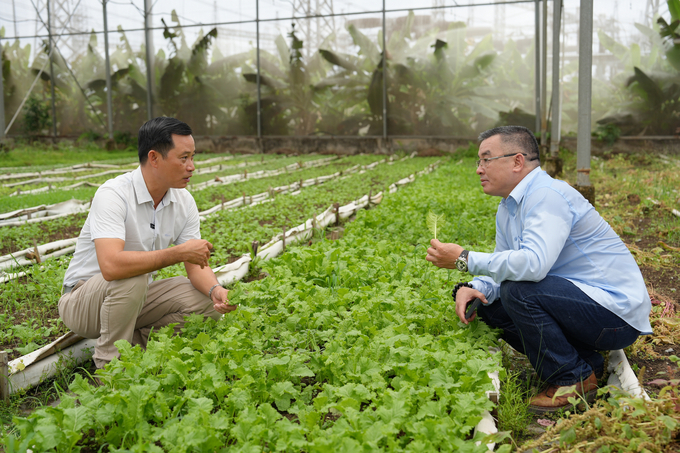
Nhat Thong General Director Pham Huu Thoi: "Vegetables can be picked and eaten in the garden. Even if consumers are "lazy" they can cook them without further washing. Photo: Tuy Hoa.
Our next stop on the tour of Nhat Thong company was the Everyday Organic chicken, duck, and goose breeding area after we had left the vegetable gardens in the greenhouse. In this particular location, the avian inhabitants are not only provided with clean food but they are given the opportunity to cultivate their spiritual health within a large living environment.
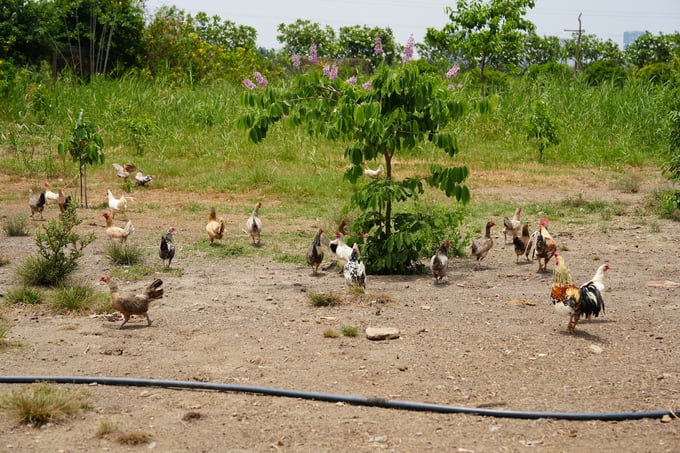
Chickens live in a wild-like space. Photo: Hong Thuy.
The chicken farm boasts a range of facilities to ensure the comfort and well-being of its feathered residents. These include rooftop shelters to protect against weather conditions, a spacious coop for egg-laying, and ample room for outdoor activities such as sunbathing and sand-burying. Additionally, the farm features a dedicated vegetable patch to provide sustenance for the poultry.
Nhat Thong's chicken, which provides both meat and eggs, has been granted EU organic certification in 2020, as shared by Thoi. For the process to be applied, the farm must fulfill certain requirements, including the use of sourced seed and organic food that is free from chemicals, pesticides, growth agents, antibiotics, and toxic substances. Clean standards are ensured by sources of water, soil, and air.
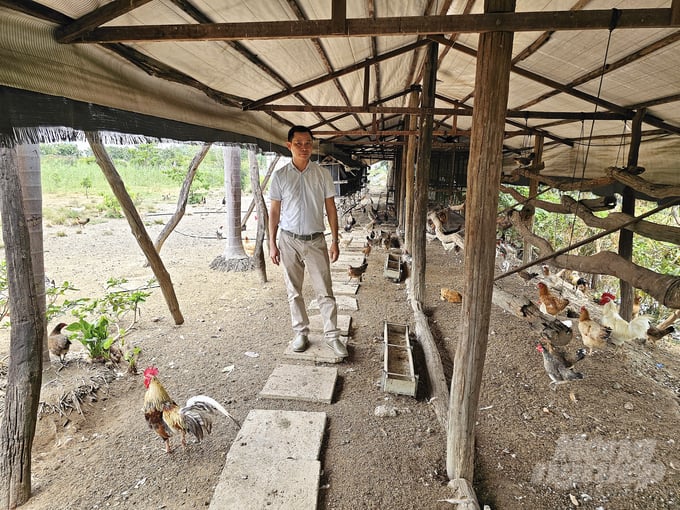
Pham Huu Thoi: "Doing organic farming is not too difficult, just having passion, community responsibility, and well-prepared knowledge is possible". Photo: Hong Thuy.
"Organic husbandry farming is more challenging compared to organic vegetable farming. This is due to the rigorous care process involved, as well as the requirement of providing each poultry with a minimum of 4m2 of space for relaxation. To accommodate the needs of both chickens, the barn should include 30-40cm roosting bars or perches and a pond surface for the ducks and geese to swim. The cost of investing in organic livestock production is estimated to be 30-35% higher than that of industrial livestock production. Chickens are not subjected to continuous egg-laying in a manner that could be considered "forced" unlike in industrial farming practices, resulting in lower egg production. Organic poultry feed is considered to be one of the most challenging types of feed", Thoi said.
Ensuring disease-free poultry and preventing epidemics is crucial as no antibiotic is used for disease prevention. In order to prevent the spread of disease, it is necessary for the living environment of poultry to be kept clean and located in high barns that are easy to drain. Additionally, it is important for the environment to be situated away from polluted areas and for buffer zones and barriers to be in place to protect the birds from external factors. When it comes to designing breeding cages, proper ventilation is crucial. It's important to ensure that there is adequate air circulation and direct exposure to sunlight. Additionally, the cages should be convenient for feeding, drinking, and exercising. It's also important to keep the cages warm in the winter and cool in the summer.
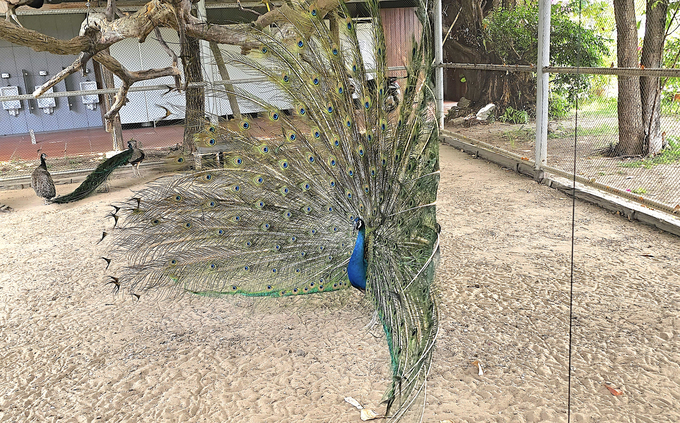
A "peacock" shows off his beauty at Nhat Thong farm. Photo: Hong Thuy.
Organic farming yields superior quality meat and eggs compared to industrial farming as a result of its practices. Organic poultry eggs offer a distinct taste and quality compared to their conventional counterparts. According to recent findings, organic eggs are reported to have a less fishy odor compared to conventionally raised poultry eggs. Organic eggs, when cooked, are said to possess a more distinct taste and a more sweet, buttery flavor compared to traditionally produced eggs. Organic chicken feed requirements are significantly lower, at only 50-60% of those for industrial farming. As a result, organic eggs are priced at approximately three times the cost of traditional eggs. Nhat Thong's organic egg supply to the market is currently limited to a few hundred per day.
Translated by Linh Linh

(VAN) 14 out of 35 domesticated elephants in Dak Lak province have had their living conditions improved, with 11 of them currently participating in the non-riding elephant tourism model.

(VAN) Muong Nhe Nature Reserve hopes that being upgraded to a national park will lay the foundation for forest protection efforts to be carried out in a systematic, modern, and sustainable manner.
/2025/05/16/3923-2-171845_52.jpg)
(VAN) Lower costs, higher yields, and improved soil quality are outstanding benefits that soybeans bring when integrated into the crop rotation system.

(VAN) The 'For a Green National Environment' programme aims to promote a green lifestyle, support businesses in implementing ESG practices, and turn Net Zero commitments into concrete actions.

(VAN) Cold-barn systems efficiently manage environmental and temperature conditions, which aids in the prevention of respiratory diseases in pigs and protects them from the vectors that transmit African swine fevers.

(VAN) To tackle challenges, the project 'Addressing key technical bottlenecks in the grouper supply chain in Vietnam' has been underway since 2024.

(VAN) The project 'Disease-Resilient and Sustainable Cassava Production Systems in the Mekong Region', funded by the Australian Center for International Agricultural Research (ACIAR), is being implemented from 2024 to 2028.